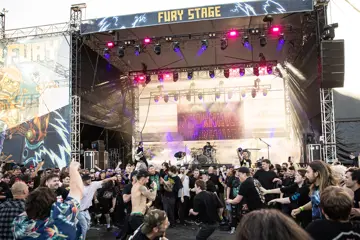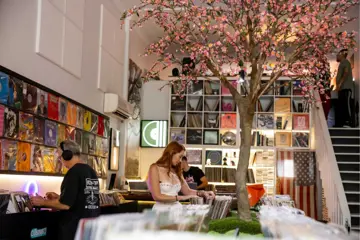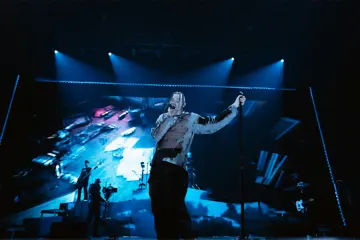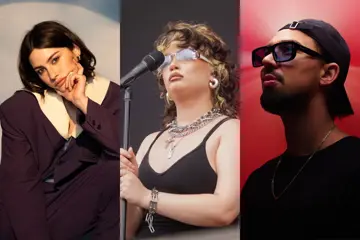So although the American band make with shoegaze, today, for instance, their sound's also recognised as electronic, rock and, err, cinematic. Trace the cinematic lineage to Curtis' love affair with Twin Peaks and other über-cool goggle box exploits that tell a story. A few listens to anything School Of Seven Bells have produced tells a story, albeit an abstract one. Memorable concepts, arrangements and elements are omnipresent – aggressive guitar riffs, tribal beats that ramp and refuse to subside, synths that pay homage to early electronic music. All this leads to an almost alien combination when Curtis and Deheza combine the varying fundamentals. “Electronic music's always been something Ben and I had been interested in. We've come from mostly rock backgrounds, but I've always loved playing with drum machines and programming beats. It was the kind of music that made a huge impression on me.”
Deheza spent her childhood in South Florida, USA – a breeding ground for electronic music. “Most things I heard on radio growing up had an electronic influence. I remember hearing New Order, which made a big impression.”
The band came together after Curtis met twin sisters Alejandra and Claudia Deheza while touring with his previous band, Secret Machines. All three subsequently left the bands they were in, moved in together, established a home recording studio and launched an all-consuming venture called School Of Seven Bells. The band's debut album, Alpinisms, was released in 2008 and they subsequently toured off the back of the album's success.
Don't miss a beat with our FREE daily newsletter
Although Deheza readily admits her love affair with electronic music, School Of Seven Bells are relative newcomers to the electro genre. Past albums are hazy – ambient even – and struggle to be defined as electronic.
Even now, Deheza retains a fascination with the strange and beautiful. Take the rationale behind the band's debut, Alpinisms. The literal interpretation of alpinism may be more akin to mountain climbing, but the band states the name originates from a book called Mount Analogue. The book tells the story of a group of people that set out on a climbing expedition to a mountain that does not exist except metaphorically speaking, the true meaning of the book being about life and the way we climb and conduct ourselves. Deheza doesn't dwell on the metaphorical linkage, with preference given to the ideological semblance. If that sounds confusing, Deheza has another explanation, “I think our music is textured and there's lot of images that come to mind when you listen to it. The sounds we make are like pictures and I always feel there's a lot of colour and romance in what we make.”
This being music, however, there's always room for one departure and/or inclusion. And on October 12, 2010, it was announced that Claudia Deheza had left the band for personal reasons. “As far as the energy of the band goes, I feel like everybody's doing what they want to do,” the remaining sister suggests. “That has a very healing effect. Being involved in music is a great life to have but it's hard if you want to do other things. Everybody's focus has to be one hundred per cent into the music.”
Earlier this year, School Of Seven Bells released Ghostory. The album, although received well by media and punters, was, as suggested, angled firmly towards more of an electronic approach than previous offerings Alpinisms and 2010's Disconnect From Desire. It was a deliberate tactic. “The album was written in tandem by Ben and myself. With this album, it was a cathartic experience as it was very difficult for me to write,” she admits candidly.
The difficulty in writing Ghostory, was the result of not confronting past fears. “There's a reason why these emotions and these other things stayed with me as I'd put off dealing with it. The album made me look at all these emotions again and gave me a chance to let them tell their story. I feel like when things happen you rush past them and put a label on them like, 'I'm moving forward.' The trouble with that is things always catch up with you as you can't run away from yourself.”
Ghostory was the first record made without Alejandra's twin sister, Claudia. Not that that affected the way the story was told. The ghost referred to in the album's title is not of the paranormal kind, but she's hesitant to delve deeper into the true definition despite it being an obvious topic of interest and immense passion. “People only think about ghosts as being these things that spook you. I believe in energies and feel strong emotions. The story behind Ghostory is about how I was terrified of feeling sad and I avoided dealing with it at all costs. Sometimes situations make you really sad, but it's not as bad as you make them.”
So what's making her sad? “The emotions and things I'd put off.” It's difficult to cast opinion. It's a truism for Deheza that Ghostory represented a huge release of pent-up energy and emotions. “It's funny as when Ben and I wrote the lyrics, I wasn't thinking about how I'd be singing these extremely personal lyrics in front of people. Ben would say, 'Are you sure you're okay to say that in front of people?' It's kind of bizarre as it seems such a private thing, but these aren't private emotions. Everybody knows what sadness and anger are.”
The decision to take the album into relatively uncharted electronic territory was also based on Curtis' exposure to sounds booming from gigantic sound systems whilst he toured. Curtis was so impressed and inspired by what he heard that he shifted perspective to electronic music for School Of Seven Bells. Ghostory has meaning for the duo. According to Deheza, the scariest part of life is the ability to demonise the unknown.
Their belief in the supernatural influences their lyrics and approach. Deheza grants that a haunting and spooky quality sits beneath their music, explaining, “I have written songs about a particular haunting or experience that I didn't realise was happening until that very moment. When I start to write songs that's when spirits come out.”
Still, most agree School Of Seven Bells blur the lines between art and real life. Their albums consist of hazy lyrics overlain with an almost eerie quality. Moreover, they've previously discussed a concept called lucid dreaming whereby being in a dream is akin to real life. People, places and moments are very much real and being in a dream state is par for the course. If that all sounds a little fluffy or abstract, think again. “I don't believe our lyrics are abstract,” says Deheza definitively. “Everything we create is natural and never in just one direction.”
Touring's another one of Deheza's great loves. “I love the constant touring and have no idea what to do or how to occupy myself when I'm not touring,” she laughs. “I love the energy and the strange combination of adrenalin and absurd situations. Right now for instance, I feel like I'm tripping as the jetlag is kicking my arse. I'm tired and want to sleep, but I'm in fucking Tokyo and I just want to go out and see it. I love it. It's psychotic, but I love it,” she admits, laughing once more.
















